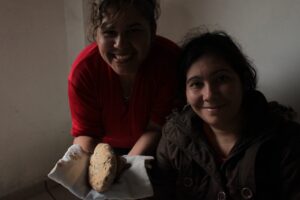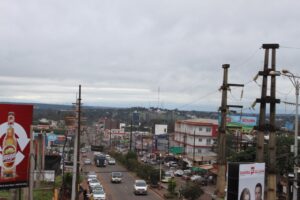Engaged Anthropology Grant: Caroline Schuster

Caroline Schuster is a Lecturer at the School of Archaeology and Anthropology, Australian National University. In 2009 she received a Dissertation Fieldwork Grant to aid research on “Making Good Money: Microcredit, Commercial Financing, and Social Regulation in Paraguay’s Tri-Border Area,” supervised by Dr. John Comaroff. In 2014 Dr. Schuster received an Engaged Anthropology Grant to aid engaged activities on “Economies of Gender in Paraguay”.
This engagement project is based on my research about women’s microfinance loans in Latin America. As a feminist scholar interested in issues of gender justice, I set the goal of engaging with the microfinance industry by way of outreach and awareness on women’s perspectives and voices in Paraguay. In my research I found that the small-scale loans offered by Fundación Paraguaya, the country’s largest microfinance provider and institutional site of my long-term fieldwork from 2009-2010, had a complex effect for the women who borrowed.

As I argue in my book, Social Collateral: Women and Microfinance in Paraguay’s Smuggling Economy, even the seemingly technical financial aspects like credit scores, loan contracts, payment schedules, and debt collection, worked together to create gendered interdependency through “social collateral.” In other words, while normal bank loans usually require some sort of physical asset to underwrite the debt as collateral, microfinance is unique in supposing that women’s mutual support and group pressure will guarantee repayment. I argue that even the humdrum technical aspects of loan underwriting have powerful – and gendered – causes and consequences. At the same time, those financial processes were invisible when women were taken to be naturally hyper-obligated – bound by kinship and caring roles. The powerful appeal of the iconic “woman entrepreneur” justified these specialized development loans while gendered financial labor simultaneously went unnoticed. I hoped to showcase feminist research on the economy to open a conversation.

Even though I had been in contact with a robust network of feminist scholars in Paraguay and Argentina, I found an unexpected hurdle. For this group of professional women, their unstable work – often in short term, flexible, and project-based contracts – made the seemingly straightforward task of organizing a symposium extraordinarily complicated. Two researchers had moved abroad with their families. One was on short-term assignment as the ‘gender specialist’ attached to a larger development project. Two more were uncontactable because their professional affiliations had lapsed.
My failed symposium exposed precisely the double-bind that went to the heart of my research. As I argue in my book, Paraguayan labor economists conclude that women work predominantly in low-paying positions in small and microenterprises because of their “flexibility” (flexibilidad). According to this line of reasoning, flexibility allows women to fulfill family obligations as well as work for income but also means that they must settle for jobs with a high degree of precariousness and limited social security and pension access. But the recourse to “flexibility” in labor theories, as feminist economists like Drucilla Barker have pointedly argued, is bundled up with a broader value judgment about women’s work, and the apparent inevitability of women’s social and kinship obligations.
In the end, the very labor dynamics that inspired my engagement project ultimately frustrated my efforts to organize a symposium thematising women’s work. Simply put, it was shaped by the gendered and gendering expectations about women’s economic lives that I am dedicated to challenging in my broader scholarship.

At an impasse, I changed course and built my Wenner-Gren engagement project around the single institutional framework that had remained constant throughout the past 10 years of my ethnographic research: the microfinance non-government organization (NGO) Fundación Paraguaya. The momentum created by 18 branch offices, nearly three hundred employees, long-term capital investments, and a sustainable financial model, put the organization on firm footing since it was founded in 1985. And while many on-the-ground staff changed quite quickly, a dedicated group of core senior managers were key contacts as my research unfolded from 2006-2016. Again, this came as no surprise as I had come to see these financial practices as regulatory forms.
My ongoing collaboration and engagement with Martín Burt, the charismatic CEO and founder of the organization, put me squarely in the uncomfortable ambit of development consulting. The now-classic distinction made by Arturo Escobar between development anthropologists and anthropologists of development, where the former was considered to be complicit with neo-colonial aid interventions and the later were considered theoretically principled scholars, was in reality unsettled conceptual terrain. How to bring my anthropological study of Committees of Women Entrepreneurs who borrowed money from a Paraguayan NGO back to the organization in a way that was meaningful and also critically engaged?
Tellingly, the result of my engagement project was actually yet another reversal. Instead of unilaterally sharing my research results, in our conversations Martín and Fundación Paraguaya instead updated me on how my earlier anthropological engagement with the NGO had reshaped some of their strategic priorities and programs in the years since I had wrapped up my long term fieldwork. I spent three weeks in Asunción learning about how my early participation as an outside consultant and researcher had reframed Fundación Paraguaya’s focus on a holistic approach to poverty alleviation. While I was certainly alarmed by the way my research on social collateral had been captured and converted into new financial products, metrics, and values, I was forced to reckon with a wider meaning of engagement beyond simply sharing what I had written with professional colleagues who shared many of my social science assumptions. The indeterminate zone between development anthropologist/anthropologist of development left no straightforward answer to how my collaborators should read what I write or vice versa.
[“Fundación Paraguaya’s Poverty Stoplight – an early collaboration]
In her edited collection on When They Read What We Write: The Politics of Ethnography, Caroline B. Brettell argued that, “Ethnographic authority survived under the cloak of distance and difference because the ‘natives’ never knew what had been written about them” (Brettell 1993: 10). My initial effort to bring my writing back to the field of development in Paraguay was a failure, and for reasons that had been anticipated in my own research. Meanwhile, my interlocutors at Fundación Paraguaya had been in conversation with my research all the while without my having known.
Working towards a different concept of ‘being there’ in fieldwork, George Marcus wrote that, “We don’t need more conferences or seminars but a different style and process of training anthropologists, also a rethinking of the standard forms and functions of writing in anthropology.” Being challenged by these reversals gave me new ways of thinking about what engagement means. Writing with my counterparts and collaborators in the field forced me to confront the fact that my training in ethics and field work methodology left me unprepared to actually deal meaningfully with engagement, and not just with my feminist allies, but also with industry partners in the field of development and finance. The net effect was to compel me to reckon with my own social collateral in the fieldwork context. In fact, could social collateral – and the webs of obligation that we invest in others – offer a vocabulary to talk and think about anthropological engagement writ large?